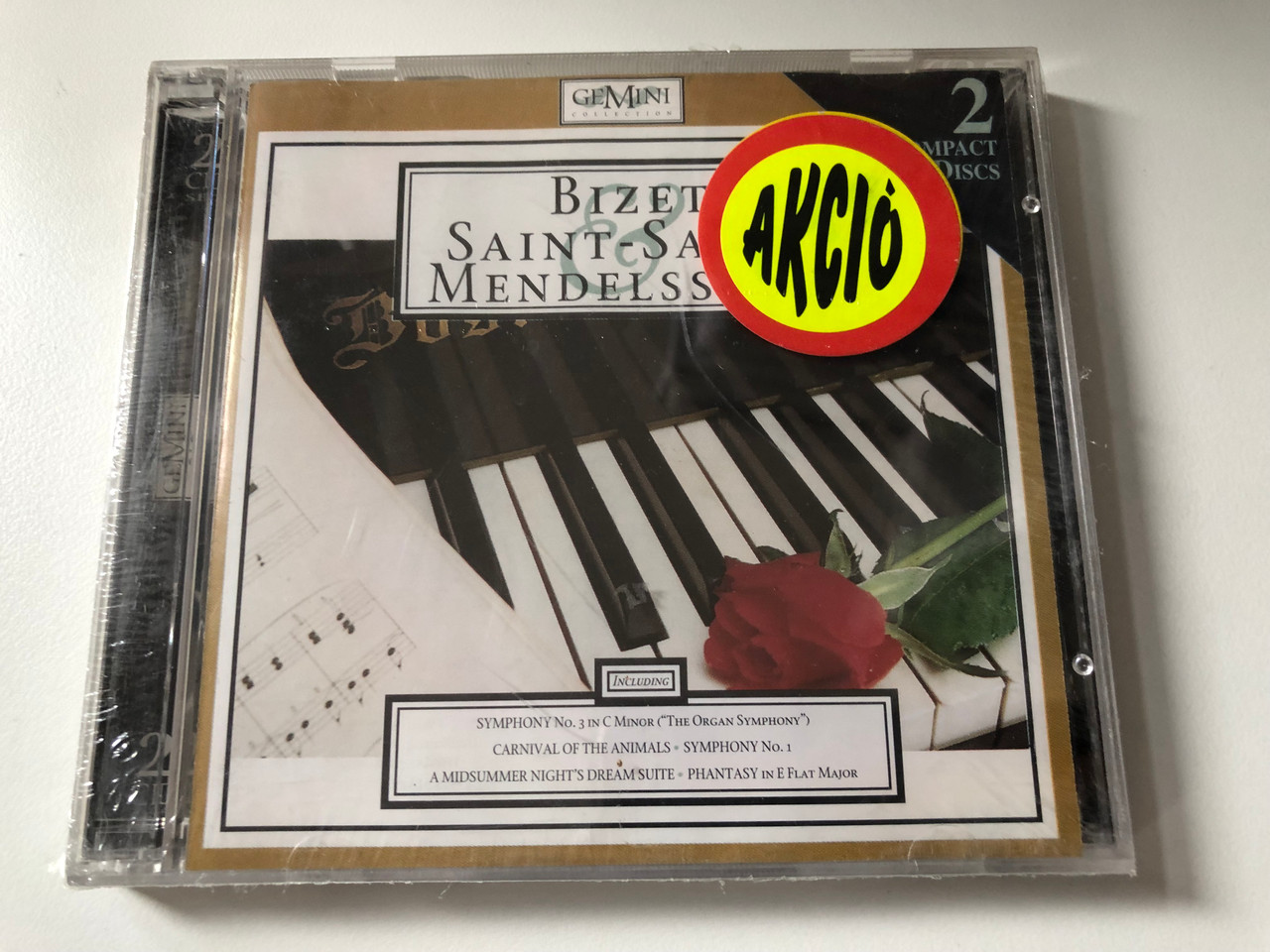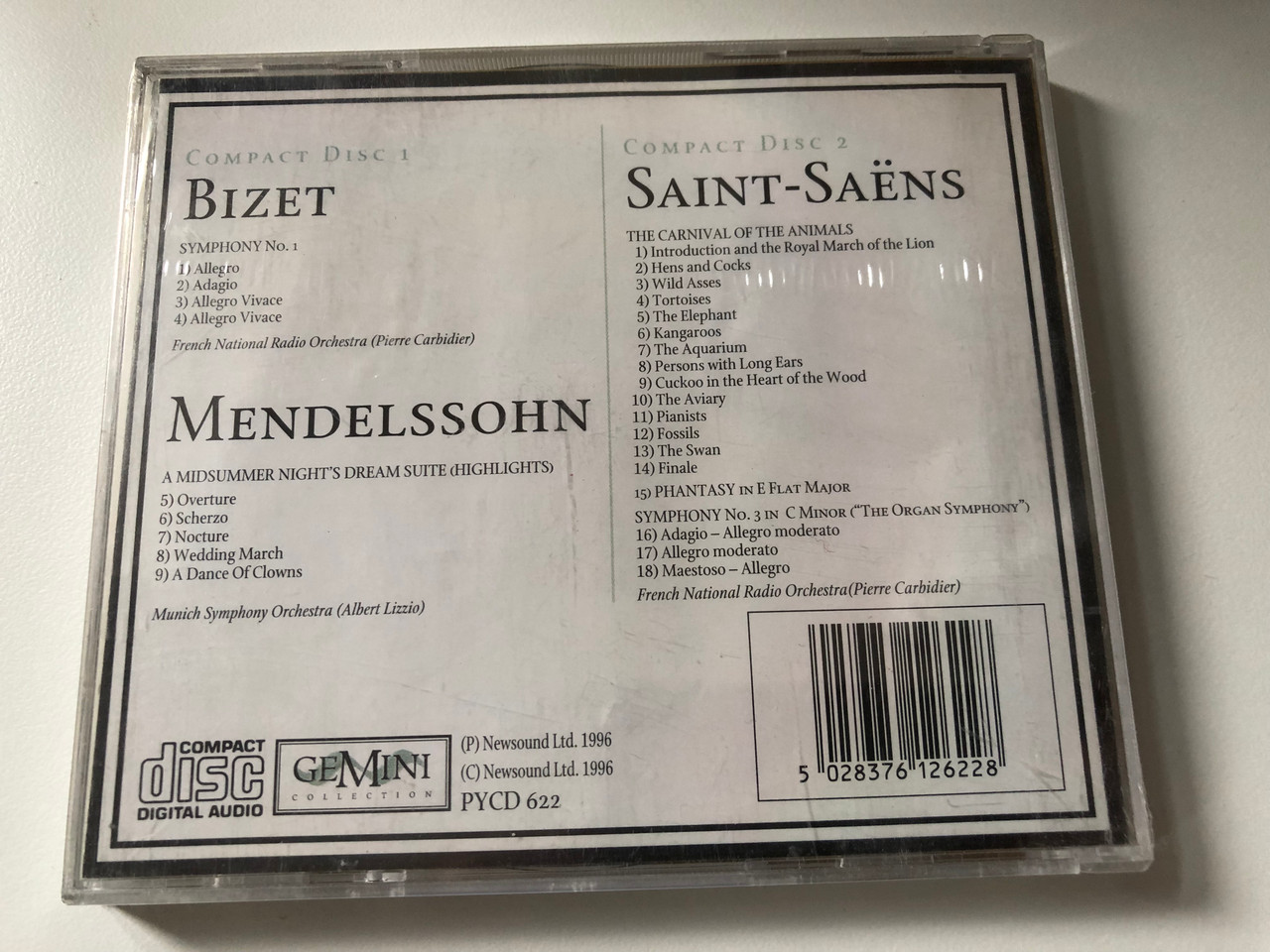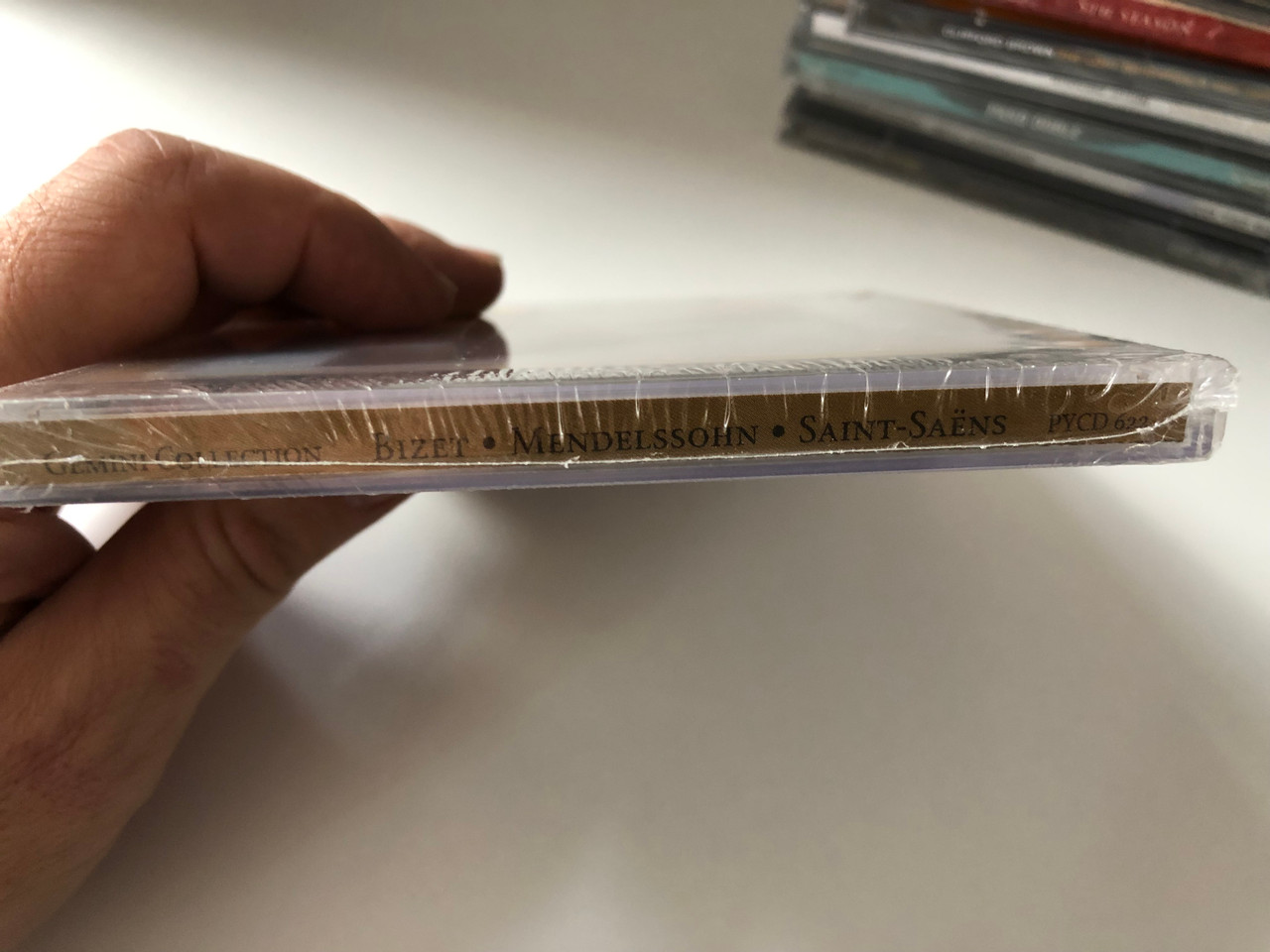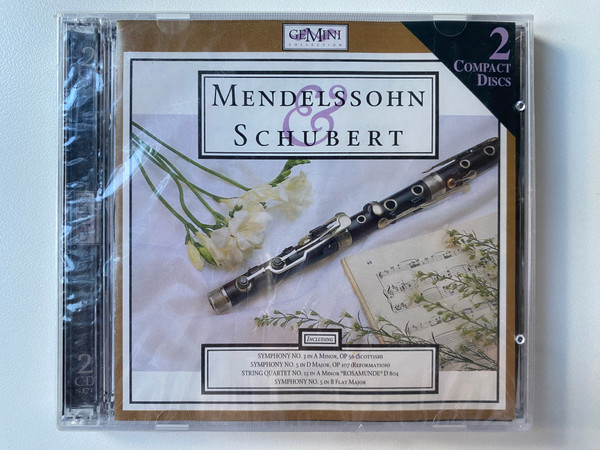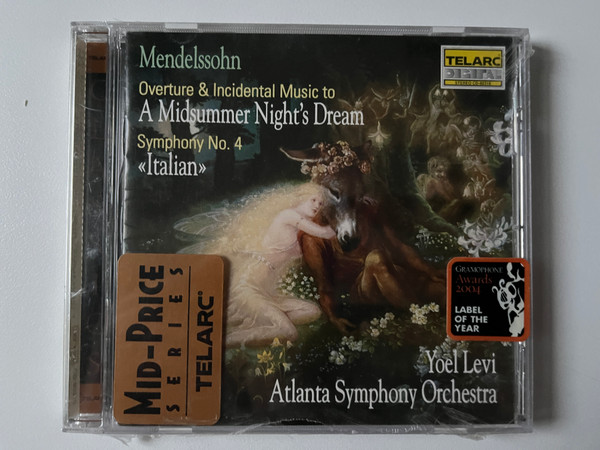Description
Bizet, Saint-Saens, Mendelssohn / Including: Symphony No. 3 in C Minor (''The Organ Symphony''), Carnival Of The Animals, Symphony No. 1, A Midsummer Night's Dream Suite, Phantasy in E Flat Major / Newsound 2x Audio CD 1996 / PYCD 622
UPC 5028376126228
Georges Bizet (25 October 1838 – 3 June 1875), né Alexandre César Léopold Bizet, was a French composer of the Romantic era. Best known for his operas in a career cut short by his early death, Bizet achieved few successes before his final work, Carmen, which has become one of the most popular and frequently performed works in the entire opera repertoire.
During a brilliant student career at the Conservatoire de Paris, Bizet won many prizes, including the prestigious Prix de Rome in 1857. He was recognised as an outstanding pianist, though he chose not to capitalise on this skill and rarely performed in public. Returning to Paris after almost three years in Italy, he found that the main Parisian opera theatres preferred the established classical repertoire to the works of newcomers. His keyboard and orchestral compositions were likewise largely ignored; as a result, his career stalled, and he earned his living mainly by arranging and transcribing the music of others. Restless for success, he began many theatrical projects during the 1860s, most of which were abandoned. Neither of his two operas that reached the stage in this time—Les pêcheurs de perles and La jolie fille de Perth—were immediately successful.
After the Franco-Prussian War of 1870–1871, during which Bizet served in the National Guard, he had little success with his one-act opera Djamileh, though an orchestral suite derived from his incidental music to Alphonse Daudet's play L'Arlésienne was instantly popular. The production of Bizet's final opera, Carmen, was delayed because of fears that its themes of betrayal and murder would offend audiences. After its premiere on 3 March 1875, Bizet was convinced that the work was a failure; he died of a heart attack three months later, unaware that it would prove a spectacular and enduring success.
Bizet's marriage to Geneviève Halévy was intermittently happy and produced one son. After his death, his work, apart from Carmen, was generally neglected. Manuscripts were given away or lost, and published versions of his works were frequently revised and adapted by other hands. He founded no school and had no obvious disciples or successors. After years of neglect, his works began to be performed more frequently in the 20th century. Later commentators have acclaimed him as a composer of brilliance and originality whose premature death was a significant loss to French musical theatre.
Charles-Camille Saint-Saëns (French: [ʃaʁl kamij sɛ̃ sɑ̃(s)]; 9 October 1835 – 16 December 1921) was a French composer, organist, conductor and pianist of the Romantic era. His best-known works include Introduction and Rondo Capriccioso (1863), the Second Piano Concerto (1868), the First Cello Concerto (1872), Danse macabre (1874), the opera Samson and Delilah (1877), the Third Violin Concerto (1880), the Third ("Organ") Symphony (1886) and The Carnival of the Animals (1886).
Saint-Saëns was a musical prodigy; he made his concert debut at the age of ten. After studying at the Paris Conservatoire he followed a conventional career as a church organist, first at Saint-Merri, Paris and, from 1858, La Madeleine, the official church of the French Empire. After leaving the post twenty years later, he was a successful freelance pianist and composer, in demand in Europe and the Americas.
As a young man, Saint-Saëns was enthusiastic for the most modern music of the day, particularly that of Schumann, Liszt and Wagner, although his own compositions were generally within a conventional classical tradition. He was a scholar of musical history, and remained committed to the structures worked out by earlier French composers. This brought him into conflict in his later years with composers of the impressionist and dodecaphonic schools of music; although there were neoclassical elements in his music, foreshadowing works by Stravinsky and Les Six, he was often regarded as a reactionary in the decades around the time of his death.
Saint-Saëns held only one teaching post, at the École de Musique Classique et Religieuse in Paris, and remained there for less than five years. It was nevertheless important in the development of French music: his students included Gabriel Fauré, among whose own later pupils was Maurice Ravel. Both of them were strongly influenced by Saint-Saëns, whom they revered as a genius.
Jakob Ludwig Felix Mendelssohn Bartholdy (3 February 1809 – 4 November 1847), born and widely known as Felix Mendelssohn, was a German composer, pianist, organist and conductor of the early Romantic period. Mendelssohn's compositions include symphonies, concertos, piano music, organ music and chamber music. His best-known works include the overture and incidental music for A Midsummer Night's Dream, the Italian Symphony, the Scottish Symphony, the oratorio St. Paul, the oratorio Elijah, the overture The Hebrides, the mature Violin Concerto and the String Octet. The melody for the Christmas carol "Hark! The Herald Angels Sing" is also his. Mendelssohn's Songs Without Words are his most famous solo piano compositions.
A grandson of the philosopher Moses Mendelssohn, Felix Mendelssohn was born into a prominent Jewish family. He was brought up without religion until the age of seven, when he was baptised as a Reformed Christian. Felix was recognised early as a musical prodigy, but his parents were cautious and did not seek to capitalise on his talent. His sister Fanny Mendelssohn received a similar musical education and was a talented composer and pianist in her own right; some of her early songs were published under her brother's name and her Easter Sonata was for a time mistakenly attributed to him after being lost and rediscovered in the 1970s.
Mendelssohn enjoyed early success in Germany, and revived interest in the music of Johann Sebastian Bach, notably with his performance of the St Matthew Passion in 1829. He became well received in his travels throughout Europe as a composer, conductor and soloist; his ten visits to Britain – during which many of his major works were premiered – form an important part of his adult career. His essentially conservative musical tastes set him apart from more adventurous musical contemporaries such as Franz Liszt, Richard Wagner, Charles-Valentin Alkan and Hector Berlioz. The Leipzig Conservatory, which he founded, became a bastion of this anti-radical outlook. After a long period of relative denigration due to changing musical tastes and antisemitism in the late 19th and early 20th centuries, his creative originality has been re-evaluated. He is now among the most popular composers of the Romantic era.
| Label: | Newsound - PYCD 622 |
|---|---|
| Format: |
2x CD, Album
|
| Country: | |
| Released: |
1996 |
| Genre: | Classical |
| Style: |
Tracklist:
BIZET
SYMPHONY No. 1
1) Allegro
2) Adagio
3) Allegro Vivace
4) Allegro Vivace
MENDELSSOHN
A MIDSUMMER NIGHT’S DREAM SUITE (HIGHLIGHTS)
5) Overture
6) Scherzo
7) Nocture :
8) Wedding March
9) A Dance Of Clowns
SAINT-SAENS
THE CARNIVAL OF THE ANIMALS
1) Introduction and the Royal March of the Lion
2) Hens and Cocks
3) Wild Asses
4) Tortoises
5) The Elephant 7
6) Kangaroos
7) The Aquarium .
8) Persons with Long Ears |
9) Cuckoo in the Heart of the Wood .
10) The Aviary
11) Pianists
12) Fossils
13) The Swan
14) Finale
15) PHANTASY INE FLAT MAJOR
SYMPHONY No. 3 IN C Minor (THE ORGAN SYMPHONY)
16) Adagio — Allegro moderato
17) Allegro moderato
18) Maestoso — Allegro
- Orchestra - French National Radio Orchestra, Munich Symphony Orchestra
- Conductor - Pierre Carbidier, Albert Lizzio







